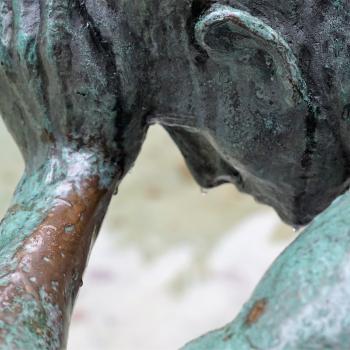The lectionary reading for this coming Sunday is from the Gospel of Matthew, 15.21-28 – the faith of the Canaanite woman. On many of my readings over the years, all I could really think about in this short story is how apparently rude Jesus is to the poor woman. First he ignores her; then he dismisses her as ineligible for his mercy. Really. Is this any way for the Savior of all the world to behave?
I’ve spent some time, too, thinking about the woman’s boldness. Love it. Surely, surely her audacity and relentless confidence is what finally wins over the Lord’s attention. Surely this is a core part of the faith that is so great. And where does it come from? Desperation. Sheer end-of-my-rope urgency. Horror an inch away from hopelessness. Her daughter was “suffering terribly.”
But in my latest readings of this text, I have come to appreciate something else about this exchange. This woman sees something true about Jesus. Whatever rumors were swirling around her community, whatever remedies she had already exhausted, whatever her pagan neighbors were going to think, this woman zeroed in on Jesus. He may refuse to help – as he did, at first – but there was no one else. He was her last resort.
What moves me so deeply is when I recognize in this Canaanite sister all of us who bear unresolvable burdens. (I’m thinking that would be everyone.) Each of us has that personal place of “suffering terribly.” Sometimes these tortures are our own; sometimes they are a sharing in the agonies of someone we love. They are places of brokenness that have not succumbed to our best spiritual, relational, financial, or emotional efforts to mend. They are the constant companions of sorrow, malice, illness, pain, fear, and weakness of every kind. We are all from Tyre and Sidon.
And consider Ms. Canaanite’s options. I’m sure she had exercised every option she had. She certainly had access to a rich variety of Greek gods and goddesses to address. Perhaps she had already had this conversation with Zeus? But when you look at the menu, the choices seem so limited… there are gods and goddesses of war and hunting, sea and mountains, fire and death, drinking and sex. But no, none of those seem quite appropriate.
Perhaps she knew of ancient Canaanite gods who might help. Baal? Or newer Persian gods. Mithras? Was there no one whose primary reputation was of power over evil?
But today we live in a smorgasbord world, where a pantheon of gods and prophets, divine messengers and supernatural conduits awaits our attention. Would Ms. Canaanite have better options today? To whom might she turn in her burning quest for a miracle?
Buddha? Would Buddha be able to help her? Buddha, whose central teaching is that suffering must give way to enlightenment and freedom from the desires that lead to suffering?
Vishnu? Would Vishnu the preserver, one of the greatest of the Hindu gods, be able to help her? Vishnu who demands that his followers recognize and bear the karmic results of an earlier existence?
Muhammad, the messenger and prophet of Allah? Baha’u’llah? Odin? Laozi? Confucius? Kartar? Asatru? Could we reasonably expect, from what we know about these men, myths, and deities, that a brazen and panicky outsider might expect mercy?
Hear me: I firmly believe that other faith traditions have much to teach me, and that there are many great religious leaders outside of Christianity, but if I were a desperate mother with a child who was suffering terribly, and I wanted a miracle of kindness and healing and power, and the full array of great gurus, sages, and guides from history were before me, I would take my chances with Jesus. He may say no. But he’s also the only one who could say yes.












